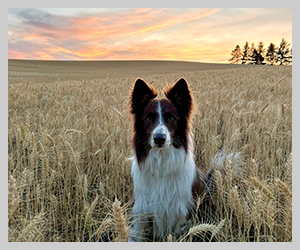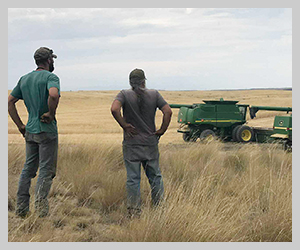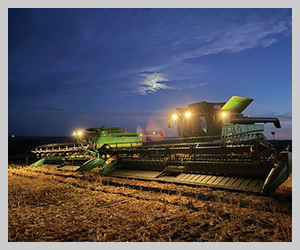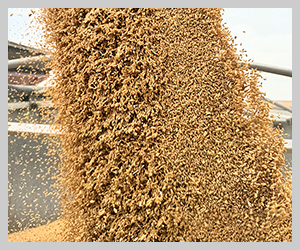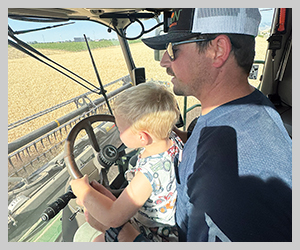Homegrown scientist returns to PNW wheat industry Cat Salois, Director of Research and Technology, The McGregor Company
2025April 2025
By Kevin Gaffney
Special to Wheat Life
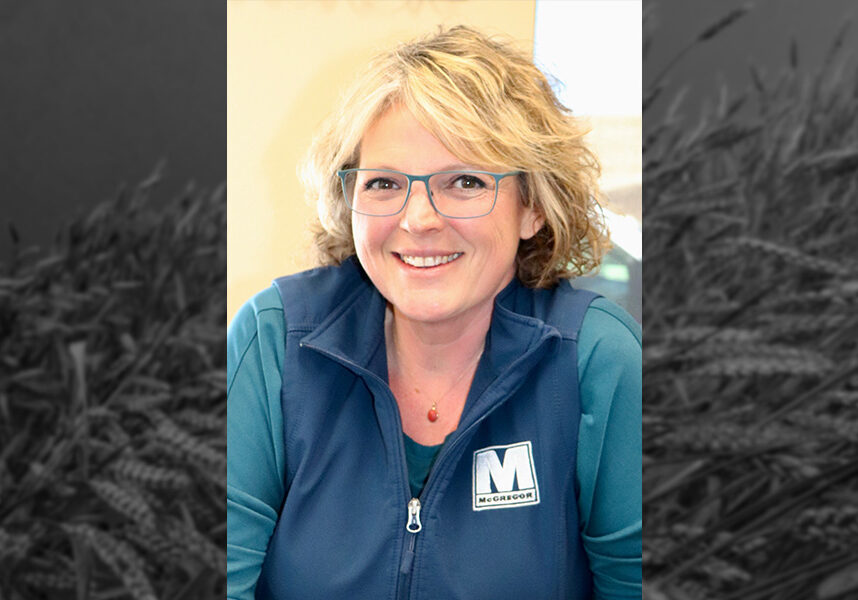
It would seem Cat Salois was destined to be involved in the Pacific Northwest (PNW) wheat industry. Her father was raised on a farm near Goldendale, and Salois was born in the fertile Willamette Valley in Oregon.
Both of her parents earned degrees from Washington State University (WSU). Before the family moved to North Dakota for her father’s employment at North Dakota State University, Salois graduated from Pullman High School in 1999.
“I was interested in crop genetics from a young age, partially due to my father’s involvement in the Future Farmers of America,” said Salois. “The science of how plants grew and developed was always fascinating to me.”
The family spent several years in North Dakota until they moved back to Pullman when her father accepted a faculty position at WSU. Salois’ interest in wheat breeding grew stronger during high school and college when she worked on a Pullman area wheat farm. She also had the unique opportunity to meet and work with WSU crop breeder Kim Kidwell on local field trial test plots.
“That time spent working with Kidwell and later with Steve Ulrich only strengthened my strong determination to become a plant breeder,” explained Salois. She earned her bachelor’s degree in crop genetics at WSU and her master’s degree in crop genetics from Montana State University in Bozeman, Mont.
Salois, who is in her 10th year as director of research and technology for The McGregor Company, returned to the Palouse after working in the Midwest for a decade. Her first employment after college was as a soybean plant breeder for Pioneer Seed in Ohio. She was eventually downsized out of her position when the company merged with Dow Agrosciences. That same company has since merged again and become Corteva Agriscience.
“It was interesting, because all my work and studies at WSU had been with wheat. Before accepting the position with Pioneer, I had hardly even seen a soybean plant,” said Salois. “There was a lot to learn, but it worked out well for me with Pioneer Seed for those 10 years. However, the company had to layoff 1,500 workers, and I was one of them.”
Fortunately, she was given a severance package that allowed her some time to contemplate her career path.
“Fate sometimes takes us to places we don’t expect on timelines we don’t anticipate,” she said. “I thought long and hard about my career, and I decided to contact my Pullman High classmate, Ian McGregor, to see if there might be a position available for someone with my skills and experience at The McGregor Company.
“That call turned out to be fateful, as the long-time director of research for The McGregor Company was ready to retire. The position didn’t exactly match what I had been doing, but I was up to the challenge and believed I could handle the job. I was able to return to my roots with my family and the wheat industry I grew up in. I guess you could say the rest is history.”
Her office is located at the company headquarters in Mockonema, just west of Colfax, Wash. She has three full-time employees working in her research department. The company has its own research farm with 320 acres of cropland near their offices.
“Our mission is to identify and understand problems facing wheat growers here in the PNW and to solve them,” said Salois. “It is our duty to understand the impacts of these problems and find solutions that work for our growers. That means we are working with wheat varieties, seed treatments, herbicides, fungicides, insecticides, plant fertility, basic agronomy, precision ag, and everything in between.”
Salois explained that with over 35 retail locations in Washington, Oregon, and Idaho, the company has 2.5 million acres of dryland crops under their retail management.
“I believe this really helps us to have our fingers on the pulse of the regional wheat industry and provide optimum services to our growers,” she said.
The McGregor Company acquired D & M Chem last year, which added many irrigated growers. That company, based in Moxee, Wash., works with growers producing apples, hops, cherries, blueberries, and other irrigated crops.
D & M has continued operating with their staff of over 30 professionals as part of The McGregor Company. It expands the McGregor territory into the Yakima Valley and includes growers that produce about 70% of the hops grown in the U.S.
Salois explained that The McGregor Company works with all wheat breeders, both public and private. The main objective is to identify the best wheat varieties to help growers be as profitable as possible. With the wide variety of soil types, terrains, and moisture ranges across the expanse of the PNW, what works well in one area may not work at all in other regions.
“Our account managers are professional agronomists. They have a clear view of the best ways for our growers to maximize profits,” said Salois. “They provide a direct conduit to the growers. We have an effective tool set that allows us to do excellent whole-field agronomy. The next step is to use all the precision ag equipment and technology available to go to the next level for a more site-specific system of crop management.
“Only about 20% of our growers are currently using variable rate fertilizing as part of their operation. While auto-steer and other GPS technology is being widely used, we’d like to see more growers complete the circle by using crop yield data to set up five-zone fertility systems to determine the level of nutrients, herbicides, fungicides, and other inputs. Every farm and even every individual field has enough variables to make this system pay for itself in a short time frame.”
With growers in such diverse regions of the PNW stretching from central Washington east into Idaho and south into Oregon, crop varieties and rotations vary widely. The drier regions will often have a winter wheat/summer fallow rotation. Other areas might employ a winter wheat/spring crop/summer fallow rotation.
“Our direct seed growers generally use chemfallow as part of their rotation systems,” said Salois. “We have some growers who have begun using a winter wheat/winter wheat/spring crop rotation. The spring crop is usually canola or camelina. Others are trying out a winter wheat/spring wheat/spring canola/spring pulse crop rotation. When growers are planting consecutive annual wheat crops, we recommend certain precautions to avoid disease and weed problems. This includes rotating herbicides, fungicides, and seed treatments.”
Salois mentioned that including spring canola in rotations has helped many growers to reduce grassy weed problems. Also, employing both soil and foliar applications and using herbicides with different modes of action has been helpful to avoid diseases and weed resistance to herbicides.
In the PNW, soft white wheat is still the king of all wheat classes. Salois doesn’t expect that to change.
“Soft white is a great niche product for our region,” she explained. “It could be argued that we have the highest yields and the best quality white wheat in the world right here in the PNW. We can grow identity-preserved wheat for specific traits or milling qualities incredibly effectively.”
Salois pinpointed being able to help PNW wheat growers solve their problems as the most satisfying part of her work. The toughest choices involve deciding exactly which direction to channel the work of the company’s research team to effectively improve profitability for growers. There is never enough time or staff to find solutions to all the challenges facing wheat farmers.
Salois spends much of her off time with her dogs and her horses. She and her daughter, Lyla, compete regularly in barrel racing competitions, and as often as possible, Salois rides with her mother and daughter, enjoying a remarkable three-generation connection that is priceless to them.
To learn more about The McGregor Company research team or to contact Cat Salois, find them online at
mcgregor.com or call (509) 397-4355.





